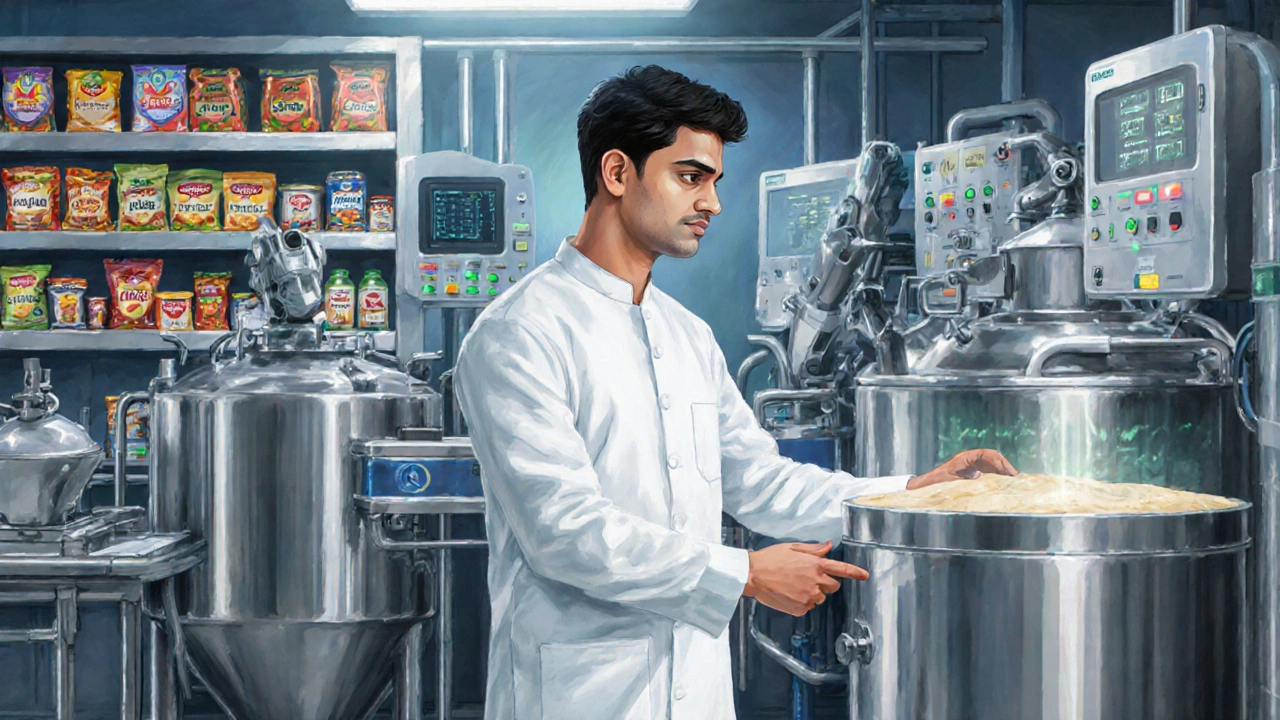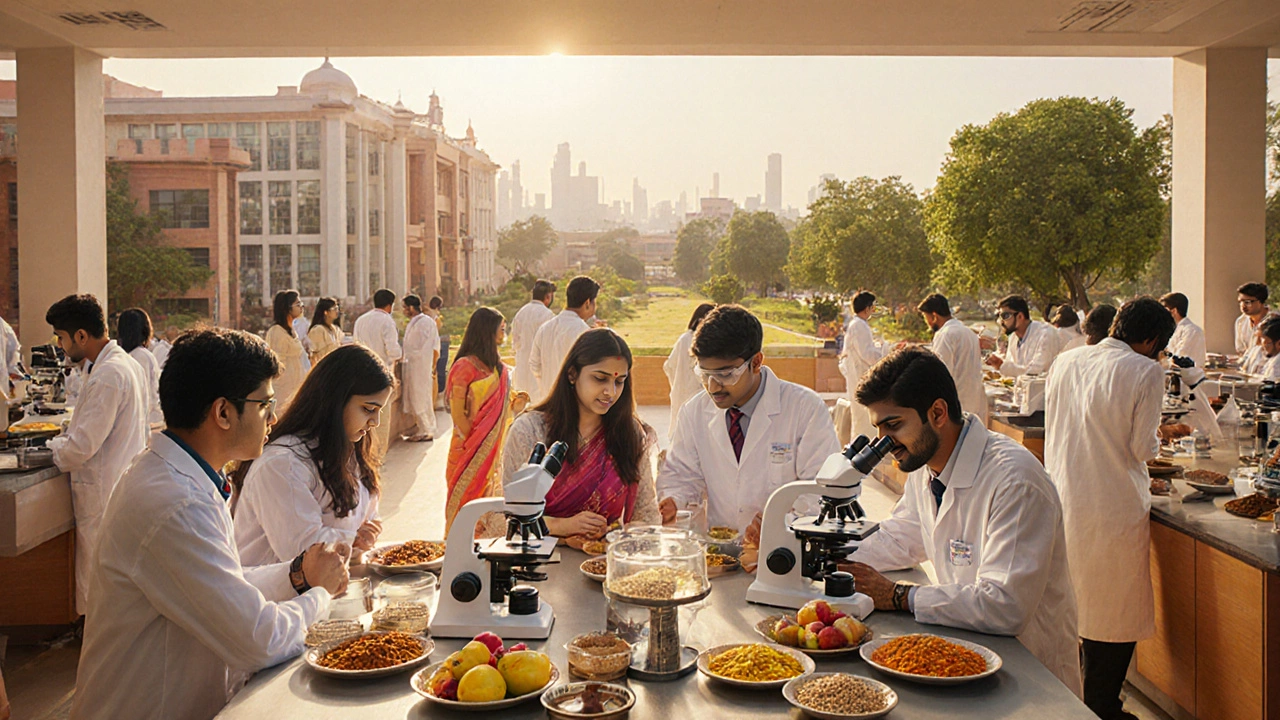Food Science Knowledge Quiz
1. Which of the following is NOT typically covered in a Food Science degree?
2. How does Food Science differ from Food Technology?
3. What is a typical duration of a Food Science degree?
Quick Take
- Food Science is offered as a recognised undergraduate degree (BSc, BA, or BSc(Hons)).
- Typical programmes last 3-4 years and blend chemistry, biology, engineering and nutrition.
- Accreditation bodies such as ACFS (American Council of Food Science) or the UK QAA ensure quality.
- Graduate roles include food technologist, quality assurance manager, product developer and research scientist.
- It differs from Food Technology (more engineering‑focused) and Nutrition Science (health‑oriented).
What Is a Food Science Degree?
Food Science is a multidisciplinary field that examines the physical, chemical, and biological properties of food, along with processing, preservation, and safety. Universities package this knowledge into a formal qualification - most commonly a Bachelor of Science in Food Science (often abbreviated BSc Food Science). The degree can also appear as a BA or an integrated master (MSc) depending on the institution.
The programme is designed for anyone who wants to turn a love of food into a science‑driven career. It covers everything from the chemistry of flavor molecules to the engineering of large‑scale processing lines, and from microbial safety tests to consumer‑trend analysis.
How It Differs From Similar Fields
People often confuse Food Technology with Food Science. While both study food, Food Technology leans more heavily on the design and optimisation of equipment, focusing on the industrial side of production. Nutrition Science, on the other hand, concentrates on the impact of food components on human health, diet planning and public health policies.
In practice, a Food Science graduate can move into technology roles or nutrition research, but the core curriculum is broader - it incorporates the fundamentals of chemistry, biology, and engineering rather than specialising early.
Typical Curriculum and Core Subjects
A three‑year BSc Food Science programme usually follows this pattern:
- Introductory Chemistry and Biochemistry - covering protein structure, lipid chemistry, and metabolic pathways.
- Microbiology - studying food‑borne pathogens, fermentation, and probiotic applications. Microbiology provides the toolkit to detect and control spoilage organisms.
- Food Chemistry - analysing flavour compounds, additives, and nutritional content.
- Food Processing & Engineering - learning about heat treatment, extrusion, packaging technologies.
- Food Safety & Quality Assurance - standards, HACCP plans, and regulatory compliance.
- Consumer Science - market research, sensory evaluation, product development cycles.
- Capstone Project or Industry Placement - real‑world problem solving with a food company.
Electives may include Biochemistry (for deeper metabolic insight), Food Safety (for risk assessment), or even Culinary Arts to appreciate practical cooking techniques.

Accreditation and Recognition
Employers look for programmes that meet recognised standards. In the UK, the Quality Assurance Agency (QAA) reviews degree content, while the Institute of Food Science & Technology (IFST) offers professional accreditation. Across the Atlantic, the American Council of Food Science (ACFS) and the Institute of Food Technologists (IFT) provide similar validation.
When a programme is accredited, graduates gain access to chartered status (e.g., Chartered Scientist, CSci) and can sit for professional exams that boost credibility.
Career Opportunities and Salary Outlook
Graduates step into a wide array of roles:
- Food Technologist - formulates new products, improves existing lines, works in R&D labs.
- Quality Assurance Manager - oversees HACCP compliance, audits suppliers.
- Product Development Chef - bridges science and culinary creativity.
- Regulatory Affairs Specialist - liaises with agencies like the Food Standards Agency (FSA).
- Research Scientist - works in universities or private institutes on novel ingredients.
According to the UK Office for National Statistics, the median starting salary for food science graduates in 2024 sits around £26,000, rising to £40,000-£55,000 after five years with experience in senior R&D or management positions.
Choosing the Right Program: What to Look For
When comparing universities, consider four key criteria:
- Accreditation - ensure the course is recognised by IFST, QAA, or ACFS.
- Industry Links - programmes with mandatory placements or strong ties to food manufacturers (e.g., Nestlé, Unilever) give you a foot in the door.
- Facilities - modern labs, pilot plants, and sensory booths indicate hands‑on learning.
- Specialisations - some schools emphasise dairy, others focus on meat, bakery, or functional foods.
Below is a quick side‑by‑side look at three common undergraduate routes.
| Degree | Typical Duration | Core Subjects | Common Careers | Average Starting Salary (UK) |
|---|---|---|---|---|
| Food Science (BSc) | 3-4 years | Food chemistry, microbiology, processing, safety | Food technologist, QA manager, product developer | £26,000 |
| Food Technology (BEng) | 3-4 years | Process engineering, equipment design, automation | Process engineer, plant manager | £28,000 |
| Nutrition Science (BSc) | 3 years | Human metabolism, public health, dietetics | Clinical dietitian, health consultant | £24,000 |
Use this table as a starting point, then dive deeper into each university’s module list and industry placement record.
Related Concepts and Pathways
Understanding Food Processing gives context to what you’ll study - it covers everything from raw ingredient handling to final packaging. Food Safety is another pillar, tying in legislation, risk assessment and consumer trust.
If you’re more intrigued by the health angle, consider a follow‑on MSc in Nutraceuticals or a professional qualification from the British Dietetic Association.
Conversely, students leaning toward the engineering side may pursue a postgraduate diploma in Process Engineering after completing a Food Science degree.
Frequently Asked Questions
Is a Food Science degree the same as a Food Technology degree?
No. While both study food, Food Science focuses on the scientific basis-chemistry, microbiology, nutrition-whereas Food Technology leans toward engineering, equipment design, and large‑scale production methods.
Do I need a background in chemistry to enroll?
Most programmes expect at least GCSE/GCSE‑equivalent chemistry and biology. Universities provide foundation modules in the first year to bring everyone up to speed.
Is the degree recognised internationally?
Yes. Accredited Food Science degrees are recognised across Europe, North America, and many Asia‑Pacific countries. Professional bodies such as IFST, ACFS, and IFT provide pathways to international chartered status.
What are typical entry requirements for UK universities?
A‑levels in Chemistry and Biology (or equivalents) are common. Some universities also consider relevant work experience, a personal statement about food interest, and GCSE maths.
Can I study Food Science part‑time or online?
Increasingly, universities offer blended or distance‑learning routes, especially for working professionals. However, lab‑based modules may still require occasional campus attendance.
What is the job outlook for Food Science graduates?
The UK food and drink sector employs over 400,000 people. Demand for new product development and sustainable processing keeps the graduate employability rate above 90% within six months of graduation.
How does accreditation affect my career?
Accredited degrees meet industry standards, making it easier to obtain professional registration (e.g., CSci) and to qualify for roles that require recognised qualifications, such as senior QA positions or regulatory affairs.
Is a Food Science degree suitable for someone who wants to become a chef?
While the degree isn’t a culinary qualification, the scientific insight into flavor chemistry and nutrition can give chefs a competitive edge, especially in experimental or fine‑dining kitchens that focus on innovation.






